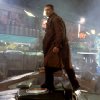If we just sit on the track, pretty soon we will be run over by the oncoming train.
If we just sit and not think at all, we outsource the thinking to others.
Inadvertently, we fall back to the default position, that of inertia.
Or give in to herd mentality, bubble mania, tulip mania and CDO mania.
Cavemen or Centennial men , all have done that. The mass lives in quiet desperation.
But, luckily, there are a few, who are labeled as “outsiders”, rabble-rousers, disruptors or free thinkers.
They “Think Different“.
Even act (or not act) differently.
Just zoom out and take a long view. You will spot them: from medical to material sciences, from the arts to technology.
These people don’t take “No” for an answer.
They are definitely not into conformity, or safety in numbers.
They don’t follow the “wisdom of crowd” (and definitely wouldn’t stop and look up to the high-rises during one of the experiments on Social Proof).
They chart and map out their own orbits.
To them, between A and B, a straight line is never the shortest. They know the universe and everything that exists is in constant motion, changing and coordinating to achieve entropy.
They might make and listen to music. But never allow themselves to be “boxed” in by the 7 notes, or restricted bandwidth. (In fact, many apps could have been around back then, but slow data transfer rate and early-stage multiplexing weren’t up to speed ).
Free mind seeks out-of-worldliness. Outliers embrace forward-thinking. Bill Gates himself took the late bus to code on off-hours mainframe. Steve Jobs got transferred to the grave-yard shift etc…
By merely going across the cultures, one can see the relativity of cultural codes.
Or by traveling along the time dimension (just look back to the Wright brothers and their first aerodynamics experiment, or the architectural displays at the Chicago World Fair which marveled attendants with dazzling electricity) helps jump-start our trend-tracking.
Worst case, one can pretend to live a college-student life, when every concept is new and each lecture is challenged.
Albert Einstein puts it well, ” the saddest thing in life is wasted talent”.
Plan “surprises” into your schedule. Take a side path, the road less traveled, as Robert Frost puts it.
Embrace diversity of opinion, be challenged and changed by them. Taste a variety of foods. Nature is sending out signals for us to decode. Take that plunge into the unknown. Be brave and be alive. For once, think instead of sitting on the track to see if the train will run on schedule. And follow not the crowd, however large its size. One neuron at a time, start thinking free. And in the process free yourself.
